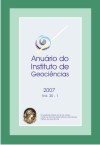Use of alternative media for paleontology knowledge dissemination
DOI:
https://doi.org/10.11137/2007_1_168-174Abstract
Paleontology teaching must be an usual subject in the cultural formation. It is from it that man understands the history of Earth and its evolutionary process, giving a new look and perspective of what behaviors a society must adopt. In order that teaching of paleontology subjects gets a response back from society, other methods beside the basic didactic books must be explored for diffusion of educational and informative message, whit less academic terms and more attractively. Searching alternatives to fill such necessities, some of the available options are: Games, expositions, animations/documentaries and paradidactic books. These media have already been used by many scholars in the area, but can always be reworked and explored. The Laboratório de Estudos de Comunidades Paleozóicas (LECP) of the Universidade Federal do Estado do Rio de Janeiro (UNIRIO) has been using one of these alternatives. It is a project of elaboration of paradidactic books that a language directed to the infant-juvenile people was adopted to introduce paleontological concepts and fossiliferous localities - Maecuru e Ererê Formations (Amazonas Basin) - from Devonian Period. The referred project, although using a resource already available in Paleontology teaching, is innovator, because it deals with Brazilian formations of a geologic period unknown by the population. By alternative educational proposes the paleontology consolidates new process of interdisciplinary, necessary for diversified divulgation of its subjects. This new paleontology vision, when assimilated by the society, allow a conscientization about the biologics and non-biologics process that have occurred along the geologic time. A holistic conscience of the evolution of the Earth would help in the formation of a new society, which is already worrying about the balance and availability of the natural resources.Downloads
Download data is not yet available.
Downloads
Published
2007-01-01
How to Cite
Faria, A. C. G. de (2007) “Use of alternative media for paleontology knowledge dissemination”, Anuário do Instituto de Geociências. Rio de Janeiro, BR, 30(1), pp. 168–174. doi: 10.11137/2007_1_168-174.
Issue
Section
Article
License
This journal is licensed under a Creative Commons — Attribution 4.0 International — CC BY 4.0, which permits use, distribution and reproduction in any medium, provided the original work is properly cited.















